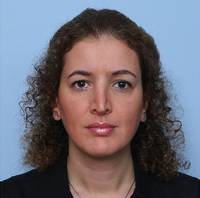Since September 1, 2015 Assistant Professor Minoo Tasbihi has joined the UniCat group of Prof. Reinhard Schomäcker as visiting researcher in order to produce methanol from carbon dioxide using light and photocatalysts.
As a result of the combustion of fossil fuels, which began during industrialization in the 19th century, the share of carbon dioxide in the atmosphere has risen dramatically. Carbon dioxide is the most significant greenhouse gas produced by humans. The Cluster of Excellence UniCat is looking for a beneficial application of carbon dioxide, and aims to make it chemically usable. More specifically, UniCat is researching the activation of carbon dioxide with the aid of catalysts.
Minoo Tasbihi’s project is based upon UniCat’s research. Tasbihi aims to produce methanol from carbon dioxide with the use of catalysts and light – ideally using sunlight. Over the past few years, the production of hydrogen from water and light was explored at the TU Berlin in the BMBF project “Light2Hydrogen”. Compared with the splitting of water into hydrogen and oxygen, the photocatalytic production of methanol has many advantages.
Since methanol is liquid, expensive gas-to-liqiuids processing is unnecessary. The mixture of methanol and oxygen that results from production is not explosive. Methanol can be used as fuel in conventional combustion engines as well as in fuel cells.
Minoo Tasbihi’s new research project involves the preparation and characterization of photocatalysts and the construction and optimizing a new photoreactor system (Figure 3). For this purpose, the aqueous titanium dioxide (TiO2) sol will be synthesized by low-temperature sol-gel method. It will be then deposited on different silicate materials. In order to photocatalytic reduction of carbon dioxide (CO2) under solar light, eventually the titania/silicate materials will be coated with noble metals like platinum (Pt), palladium (Pd), Gold (Au) by in-situ photochemical deposition method. In her experiments, Minoo Tasbihi will immobilize the carrier catalysts to fiberglass. The major advantage of this method is that – due to the transparency of the fiberglass – yield from light is increased.
Minoo Tasbihi is specialized in the synthesis of catalysts and catalyst immobilization. She can cooperate with the UniCat groups of the Professors Matthias Driess and Arne Thomas in this area. For the construction and optimization of photoreactor systems, she can make use of previous work by the Professors Reinhard Schomäcker and Michael Schwarze.
The aim of the BMBF project “Light2Hydrogen”http://www.light2hydrogen.de/, which was successfully completed in October 2014, was to store solar energy chemically in the form of hydrogen. A photoreactor was built, which now stands atop the Chemical Engineering building (TC Building). This was used to test the conversion of water to hydrogen under realistic conditions.
Minoo Tasbihi is Assistant Professor for Chemistry in the area of Environmental Research at the University of Nova Gorica in Slovenia. Last year, she successfully applied for an IPODI fellowship at the TU Berlin. She will now join the Cluster of Excellence UniCat for two years. Minoo Tasbihi was born 1978 in Tehran, where she successfully completed her studies in Chemical Engineering in 2003 with a Master’s degree in Science (M.Sc.). After a two-year research stay in Malaysia, she completed her PhD at the University of Nova Gorica in 2010. After finishing her PhD she was accepted as a postdoctoral research fellow and was working on an industrial project of Philips Research Eindhoven and Eindhoven University of Technology, the Netherlands, from 2011 to 2012.
“We are attractive for young female researchers with research interests in the area of catalysis,” says Reinhard Schomäcker. “We have the equipment, the know-how and – thanks to IPODI – we are also able to especially promote female researchers”. Professor Schomäcker works in the area of Chemical Engineering, which bridges applied basic research and applied industrial research.
IPODIhttps://www.ipodi.tu is the International Post-Doc Initiative of the Berlin University of Technology; a third party funding project within the EU’s Seventh Framework Programme for Research and Technological Development. IPODI is part of an initiative (“Wissenschaftlerinnen an die Spitze”) that aims to increase the number of women in leadership positions.
“Unifying Concepts in Catalysis” (UniCat) is an interdisciplinary research network within the framework of the Excellence Initiative of the German Research Foundation. Its main focus is on catalysis. Four universities and two Max Planck Institutes in Berlin and Potsdam are involved in UniCat. Approximately 50 working groups collaborate across disciplines on research areas that are of major interest to future scientific developments in raw material change and energy turnaround. The areas studied by the working groups include the chemical conversion of methane to ethene, the chemical and enzymatic activation of carbon dioxide, the catalytic production of hydrogen from water using sunlight as energy source, and the synthesis of active substances with the help of artificial enzymes. The Technische Universität Berlin (TU Berlin) is the host University. Since 2007 UniCat has been supported by the German Research Foundation (Deutsche Forschungsgemeinschaft - DFG) with funds from the Excellence Initiative of the German Federal and State Governments.



